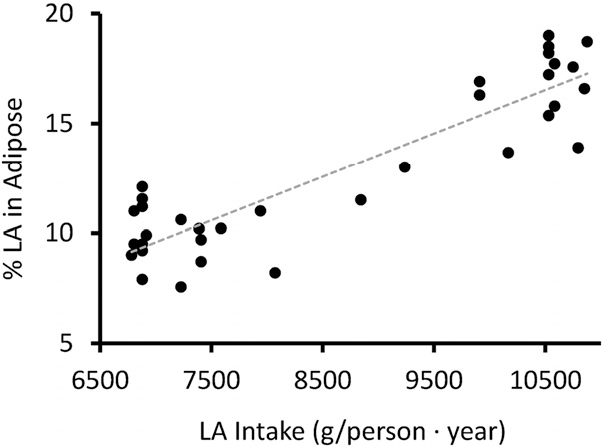My short article simply combines two ideas: unsaturated fats are softer and humans fat composition reflects that of diet.
The colder the environment, the more unsaturated the fat is. Consider tallow and coconut oil. Both solid at room temperature. The freezing point of fish oil on the other hand, is around -40°C. This makes sense. A fish with lipid composition like that of a cow’s would become stiff and immobile in cold water, hence why fish have oil and animals have fat.
Pigs have a digestive system quite similar to humans, so we absorb the oils in our diet. Ruminants on the other hand, hydrogenate the unsaturated fats with the help of bacteria.

As vegetable oils become an increasing part of our diet, there is clear data pointing to an increase in subcutaneous fat unsaturation. Linoleic acid is a common polyunsaturated fat.

So there you have it. If you’re eating tons of vegetable oil (which is found in most modern processed foods and are commonly used in cooking), you’re probably accumulating unsaturated fats in your body, which are inherently softer and less solid at room temperature, and since you’re not a fish or walrus, you’ll probably just have flabby flesh rather than slickly gliding through water at subzero temperatures. This fits my observation of people who carry extra fat on their body in how liquid it is.
So while we may hop on the PUFAs are bad train, there are some exceptions of which I don’t know the consequences of. Firstly, that not all polyunsaturated fats are bad: Docosahexaenoic acid (DHA), where insufficiency limits brain growth, which tend to be more common in a state of “aliveness,” that is, cows eating fresh grass in the spring and chickens clambering up the mountains in Greece, which is a characteristic of omega-3s in general. This information is from the book “The Queen of Fats.”
Furthermore, wild animals have higher concentrations of PUFAs than domesticated animals. They have softer and less solid flesh. Finally, that eating saturated coconut oil causes replacement of the lipids in the body with medium chain saturated fat such as lauric acid, the consequences of which may not be known.
The answer is not a simple PUFAs are bad and SFAs are good.
| PUFA | MUFA | SFA | Trans | |
|---|---|---|---|---|
| Short Chain (2-5 carbons) | - | - | Butyric acid | - |
| Medium Chain (6-12 carbons) | - | - | Capric acid Lauric acid | - |
| Long Chain (13+ carbons) | Linoleic acid Alpha-linolenic acid | Oleic acid Palmitoleic acid | Palmitic acid Stearic acid | Elaidic acid Vaccenic acid |